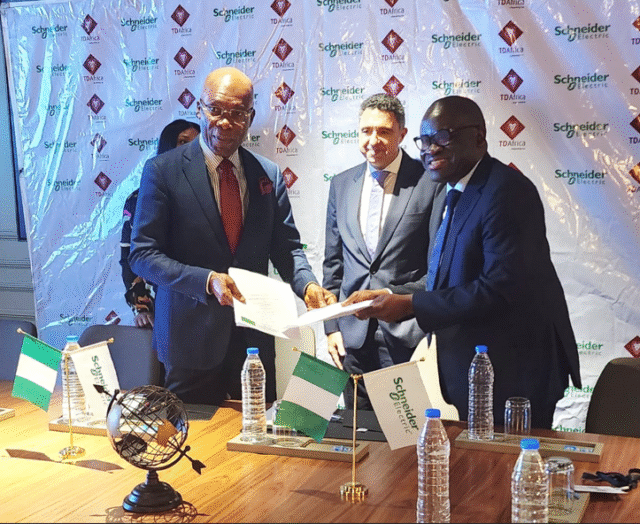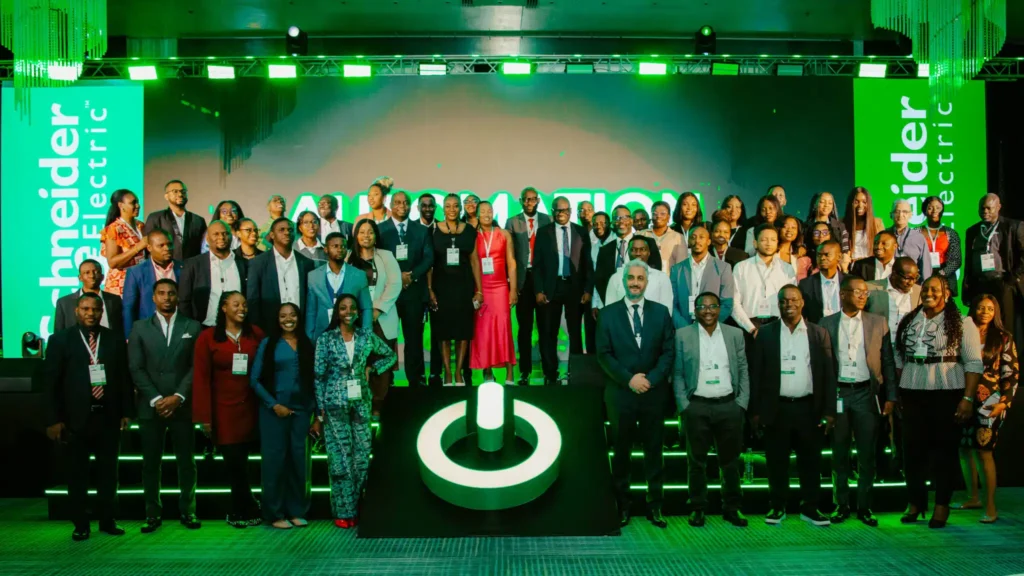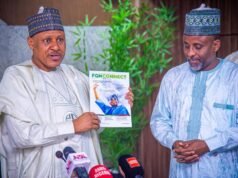
At the recently held Schneider Electric Innovation Day Nigeria 2025, TD Africa stepped firmly into the spotlight, sealing a strategic Memorandum of Understanding (MoU) that promises to reshape Nigeria’s digital infrastructure. The event also marked Schneider Electric’s 25th anniversary in Nigeria, bringing together over 450 industry heavyweights spanning public policy, energy, infrastructure, and technology.
Representing TD Africa was Dr. Leo Stan Ekeh, Chairman of the Zinox Group, whose presence underscored how serious the company is about this new venture. In his address, Dr. Ekeh described the deal as more than just business – it’s a mission to build Nigeria’s digital future. He framed the agreement as “an investment in the competitiveness of Nigerian enterprises for the next decade,” one that will back “smarter, greener, and more prosperous” growth.
Schneider Electric, for its part, brought top leadership into the fold, including Walid Sheta, Zone President for Middle East & Africa, and Canninah Dladla, Cluster President for Anglophone Africa. Their participation signalled how central Nigeria is to Schneider’s broader African ambitions.

Table of Contents
What the TD Africa and Schneider Electric MoU Means: Future-Ready, AI-Enabled Infrastructure
Under the MoU, TD Africa and Schneider Electric will co-develop next-generation data centres across Nigeria, explicitly designed for AI workloads. These won’t just be ordinary data centres — the plan covers both core facilities (large, centralised) and edge environments (smaller, closer to end-users), enabling more resilient, lower-latency digital services.
This move aligns with Nigeria’s growing digital ambition. By building AI-powered infrastructure locally, the partnership aims to reduce reliance on foreign data processing — a key consideration for data sovereignty, security, and efficiency. These centres are expected to be scalable, energy-efficient, and compliant with global sustainability standards.
Technically, the collaboration also draws on Schneider Electric’s cutting-edge EcoStruxure platform, which integrates AI, automation, and energy management. By leveraging these tools, the data centres are set to optimise power usage, cooling, and operational performance — all while minimising environmental footprint.
Why This Matters for Nigeria’s Energy & Tech Landscape
The Schneider Electric Innovation Day wasn’t just about the MoU. The broader theme — “Competitive Advantage Through Automation and Sustainability” — reflects how Nigeria is wrestling with dual challenges: scaling up its energy infrastructure and digitising its economy.
In his keynote, Walid Sheta highlighted four megatrends shaping not just Nigeria but the world: energy transition, digitisation & AI, infrastructure development, and global rebalancing. He warned that demand for data centre capacity in Nigeria is expected to double, even as more than 60 million Nigerians remain offline — a clear signal that investment in infrastructure is urgently needed.
Beyond private-sector goals, government actors were present in force. Among them were senior officials from the Energy Commission of Nigeria, the Rural Electrification Agency (REA), Nigeria LNG, and agencies focused on sustainable power. These actors underscored the need for partnerships that are not just profitable but transformational for the country’s energy strategy.

Building a Greener, Smarter Digital Future
This partnership comes at a critical juncture for Nigeria. As the nation pushes toward greater electrification and digitalisation, the demand for data-processing capacity — especially for AI — is surging. By co-creating AI-optimised data centres, TD Africa and Schneider Electric aim to meet this demand head-on.
The data centres envisaged in this MoU will likely tap into renewable energy and efficient cooling systems, following global best practices for sustainability. Schneider’s broader strategy also supports this. For example, in its Africa Innovation Hub in Johannesburg, the company is embedding digital solutions in sustainable buildings, microgrids, and intelligent data facility designs.
Aligning with this, Schneider Electric has repeatedly spoken about Africa’s need for “a new energy blueprint” — one designed by Africans, for Africans. It’s not just about providing infrastructure, but building ecosystems that can sustain long-term innovation.
Meanwhile, Nigeria is celebrating Schneider Electric’s 25 years of industrial and social impact. The company’s investment spans technical training, educational partnerships, and community development — all of which lay the groundwork for a skilled workforce ready to run and maintain advanced infrastructure like AI-ready data centres.
The Big Picture: Why This Is a Win for Everyone
- For Nigeria: Better data infrastructure → stronger digital economy → more competitive businesses on the global stage.
- For TD Africa: Reinforces its leadership in tech distribution and local capacity building.
- For Schneider Electric: Deepens its footprint in Nigeria and Africa at large, aligned with sustainability and innovation goals.
- For the continent: A step toward data sovereignty, reducing reliance on foreign cloud providers and external infrastructure.
Challenges & Considerations
Of course, such an ambitious plan will not be without hurdles:
- Regulatory alignment: Ensuring data centres meet local and international regulations.
- Power reliability: Data centres, especially AI-intensive ones, require stable and high-quality power.
- Skill development: Nigeria will need trained engineers and technicians to manage and maintain these facilities.
- Cost: Building cutting-edge AI data centres is capital-intensive; financing models will matter hugely.
That said, the MoU between TD Africa and Schneider Electric sends a strong signal: Nigeria is serious about building a future-ready digital infrastructure — not just for today’s needs, but for where technology is headed.

Conclusion
TD Africa’s MoU with Schneider Electric, sealed at Innovation Day Nigeria 2025, is more than a business deal — it represents a shared vision. A vision for a more connected, sustainable, and resilient Nigeria, powered by AI-enabled infrastructure. As the country races toward a digital future, this partnership could well be one of the cornerstones of its success.
Join Our Social Media Channels:
WhatsApp: NaijaEyes
Facebook: NaijaEyes
Twitter: NaijaEyes
Instagram: NaijaEyes
TikTok: NaijaEyes




